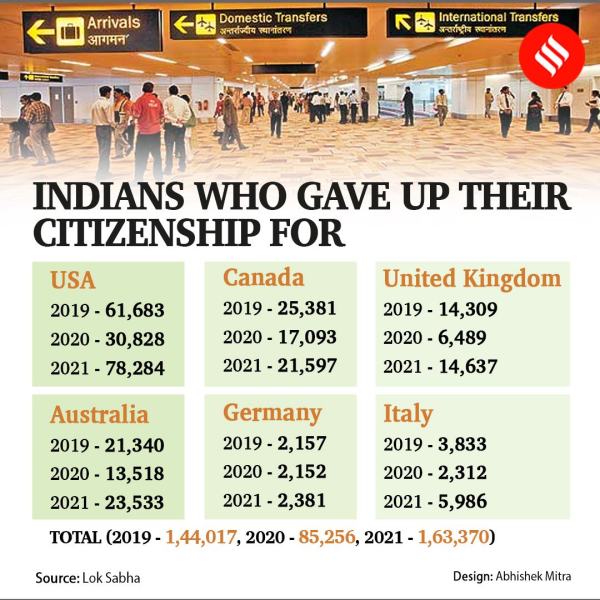Explained: Why do people give up Indian citizenship, and where do they go?
Over 1.6 lakh Indians gave up their citizenship in 2021, the government has told Parliament. Around the world people leave their countries of birth for jobs and better opportunities, but the reasons differ from country to country, and among different socio-economic groups.
 In general, around the world, people leave their countries for better jobs and living conditions. (Express Photo: Gajendra Yadav, File)
In general, around the world, people leave their countries for better jobs and living conditions. (Express Photo: Gajendra Yadav, File)Answering an unstarred question in Lok Sabha on Tuesday (July 19), the Ministry of Home Affairs stated that over 1.6 lakh Indians relinquished their Indian citizenship in 2021. The numbers marked a sharp increase in comparison to the 85,256 people who gave up their Indian citizenship in the Covid-hit year of 2020, and a somewhat smaller increase over the 1.44 lakh who surrendered their passports in 2019.
According to government data, the largest numbers of Indians who relinquished Indian citizenship in 2021 went to the United States (78,284), followed by Australia (23,533), Canada (21,597), and the United Kingdom (14,637).
 The number of Indians who relinquished their citizenship in 2021 marked a sharp increase in comparison to 2020 and 2019. Here’s where most went.
The number of Indians who relinquished their citizenship in 2021 marked a sharp increase in comparison to 2020 and 2019. Here’s where most went.
Smaller numbers of those who gave up their Indian citizenship chose Italy (5,986), New Zealand (2,643), Singapore (2,516), Germany (2,381), the Netherlands (2,187), Sweden (1,841), and Spain (1,595).
India does not allow dual citizenship, and taking up the citizenship of another country automatically results in the cancellation of Indian citizenship. The Indian government did not give reasons for the high numbers, but said that individuals renounce Indian citizenship for “for reasons personal to them”.
Why do people renounce citizenship?
The reasons vary widely from country to country, and among socio-economic and ethnic groups. In general, around the world, people leave their countries for better jobs and living conditions, and some are pushed out by climate change or unfavourable political situations at home.
As the Indian diaspora around the world has increased in numbers, with newer generations holding passports of other countries, some older Indians are choosing to leave to be with family settled overseas. In some high-profile cases — such as that of jeweller Mehul Choksi — people who leave India may be fleeing the law or fear of legal action for alleged crimes.
A 2020 report by the Global Wealth Migration Review showed that high net worth individuals around the world who renounce citizenship acquired at birth may do so for reasons of rising crime rates or the lack of business opportunities at home. “It can also be a sign of bad things to come as (they) are often the first people to leave — they have the means to leave unlike middle class citizens,” the report said.
Among the other reasons why people make the decision to migrate to other countries and to eventually acquire citizenship listed by the Global Wealth Migration Review were: safety of women and children, lifestyle factors like climate and pollution, financial concerns including taxes, better healthcare for families and educational opportunities for children, and to escape oppressive governments.
Dr Atanu Mohapatra, professor at the Centre for Diaspora Studies at the Central University of Gujarat, told The Indian Express that India’s global diasporic movements need to be analysed from a pre-Independence and post-Independence perspective.
“The post-Independence diasporic community have been going (out of India) for jobs and higher education,” Dr Mohapatra said. Those who leave for jobs can be unskilled, semi-skilled, or skilled labour, he said.
By contrast, “the pre-Independence diasporic movement was completely different, where we witnessed forced and contractual labour,” he said, pointing to indentured labour from the Indian subcontinent, particularly during the 19th century, where large numbers of individuals were forced and tricked into bonded labour and slavery and shipped by the colonial government to places like the Mauritius, La Réunion, the Strait Settlements, Fiji, Natal, South Africa, British Guiana, Trinidad, Suriname, Guadeloupe, Martinique, French Guiana, Jamaica, Belize, St. Lucia, St. Vincent, Grenada, etc.
Why do people choose certain specific countries when they leave India?
Although the Global Wealth Migration Review focuses on global data, some of its listed factors may also be applicable to Indians specifically. In general, countries where Indians have been migrating for long or where people have family or friends would be more automatic choices, as would be considerations such as easier paperwork and more welcoming social and ethnic environments.
The report highlighted the global popularity of Australia as a country that has been witnessing high inflow numbers. Factors specific to Australia that made it a popular destination included its points-based immigration system that favoured the wealthy and high-earning professionals like doctors, lawyers, engineers, and accountants, the report said.
The report said Australia may have been a top choice, in part because of English being the spoken language, in addition to its healthcare system, which unlike the US was not as complex or expensive for older individuals of high net worth.
The report listed Singapore as the emerging “top wealth management centre” in Asia, marking its potential for attracting higher numbers of these individuals.
- 01
- 02
- 03
- 04
- 05






































